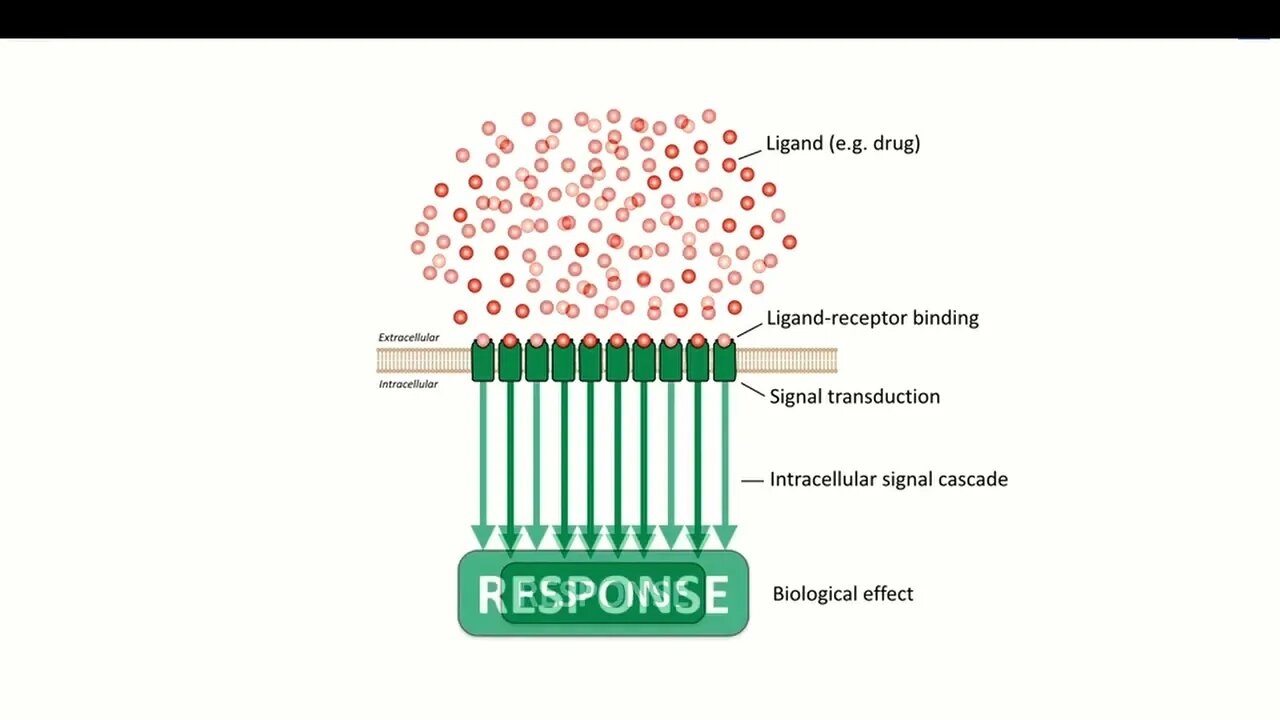Premium Only Content

4 Pharmacodynamics Receptor Agonists and Antagonists
An agonist is a drug that binds to the receptor, producing a similar response to the intended chemical and receptor. Whereas an antagonist is a drug that binds to the receptor either on the primary site, or on another site, which all together stops the receptor from producing a response.
The main difference between these two drugs is that one simulates the intended reaction, where as an antagonist binds to the receptor, and stops/ slows responses. Agonists essentially mimic the activities of normal neurotransmitters such as Acetylcholine, and emulate a similar response from the receptors they bind to. A great analogy to think of is with a vending machine. Usually to buy a drink, you would insert a $1 coin into the machine, and the response is for it to spit out your favourite soda. An agonist in this scenario would be to use a metal disc, of the same size as a coin to insert into the machine, thus using the same coin slot with a mimic coin to obtain a soda.
An antagonist does the opposite of an agonist. It binds to receptors, and stops the receptor from producing a desired response. Going back to the analogy, it’s like jamming the machine’s coin slot so that it is unable to perform its function until the blockage is removed.
–Choose an antagonist, discuss primary inhibitory mechanism and explain in detail how this relates to the way in which it interacts with receptors.– [subject brief as I may change if I can find a more interesting antagonist]
Atropine is a reversible, competitive antagonist of the receptor muscarinic acetylcholine receptors, in language that you and I can understand, it is a removable coin blocker for a vending machine that controls some of our bodily functions, such salivation and heart rate. [image of lock and key-esque model]
Atropine inhibits some of the functions of the parasympathetic system, so it effects things such as heart rate, salivation and pupil dilation. Atropine is used to treat bradycardia, that is slowed heart rate, in patients, and is also used to lower the amount of saliva produced in some specific surgeries.
-
 51:45
51:45
Talk Nerdy 2 Us
4 hours ago🔥 Talk Nerdy 2 Us – Feb 7th: HACKED, TRACKED & UNDER ATTACK! 🔥
7.96K1 -
 58:33
58:33
Man in America
11 hours agoFluoride & the Sinister Plot to Poison Us From Birth w/ Larry Oberheu
16K5 -
 LIVE
LIVE
I_Came_With_Fire_Podcast
11 hours ago🔥USAID SCANDAL | MA-GAZA | Cartel VIOLENCE Ramps Up🔥
835 watching -
 LIVE
LIVE
SpartakusLIVE
5 hours agoShadow BANNED, but we PARTY ON || Friday Night HYPE
533 watching -
 2:00:53
2:00:53
Omar Elattar
4 hours agoGRANT CARDONE: “Will I Run for Governor?” | Trump EXPOSED | Bitcoin | $500 Billion Crisis!
21.5K6 -
 46:48
46:48
Glenn Greenwald
7 hours agoGlenn Takes Your Questions On Gaza, USAID, and More | SYSTEM UPDATE #403
61.6K41 -
 56:42
56:42
Candace Show Podcast
10 hours agoBecoming Brigitte: One Coincidence Too Many | Ep 3
143K163 -
 3:14:38
3:14:38
Nerdrotic
11 hours ago $14.84 earnedDisney Plus's Complete FAILURE! Fantastic Four Trailer, MCU Phase 5 Reveal | Friday Night Tights 340
135K39 -
 1:00:58
1:00:58
The StoneZONE with Roger Stone
6 hours agoWill RINOs Sink Robert F. Kennedy Jr.'s Confirmation? | The StoneZONE w/ Roger Stone
30.4K3 -
 1:15:19
1:15:19
Edge of Wonder
7 hours agoReal Biochip Implants & Havana Syndrome Exposed: Interview With Jesse Beltran
26.7K7